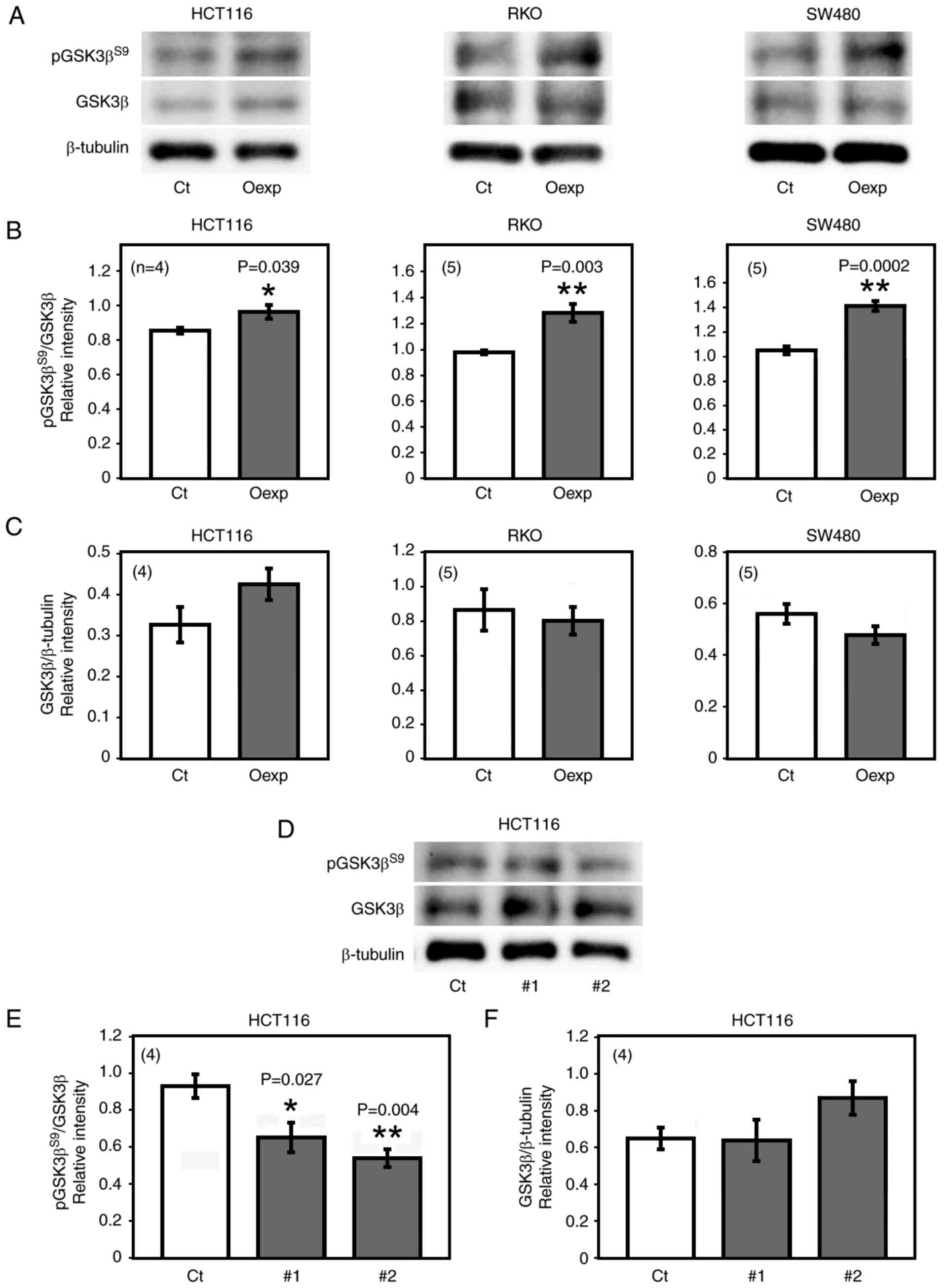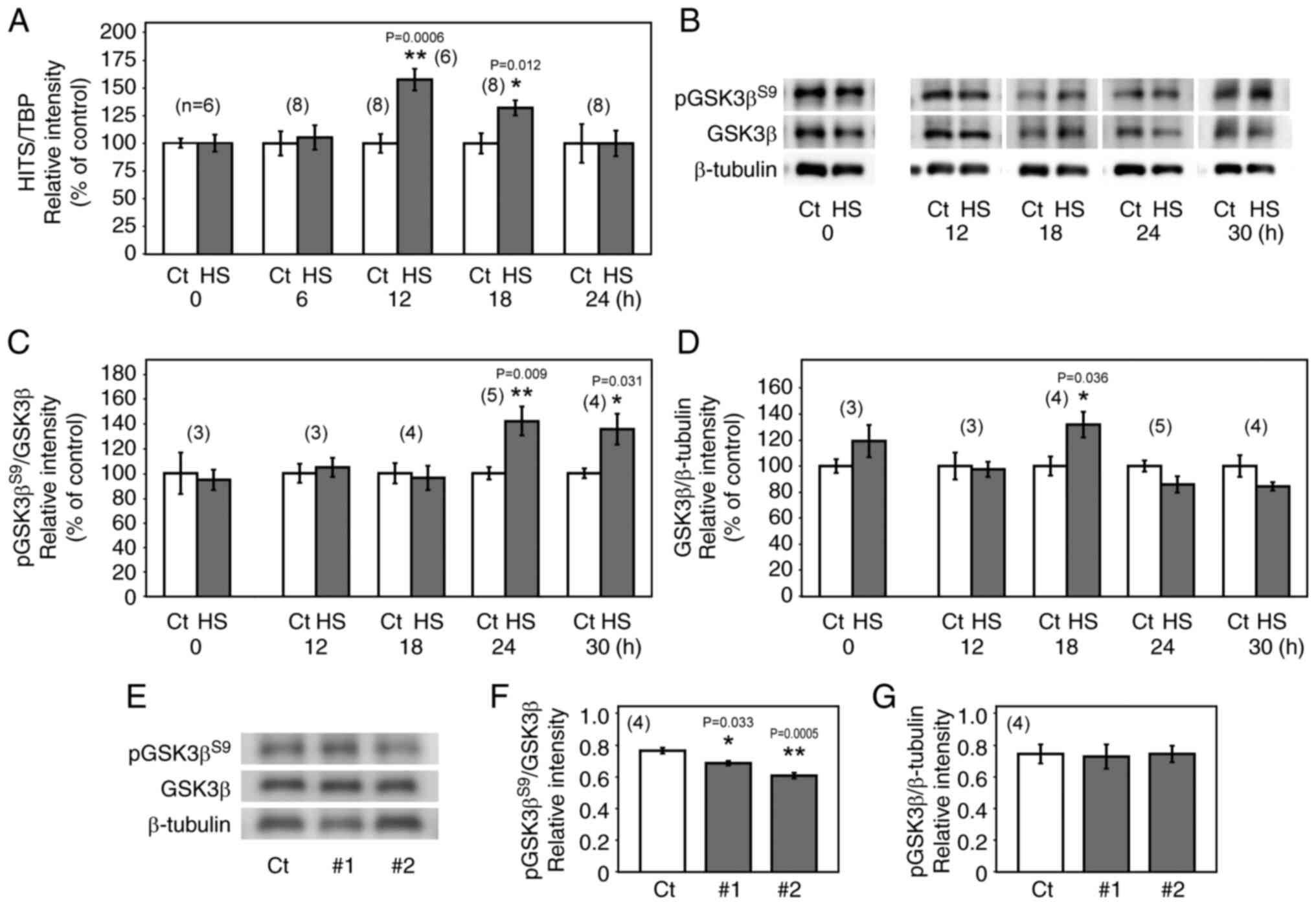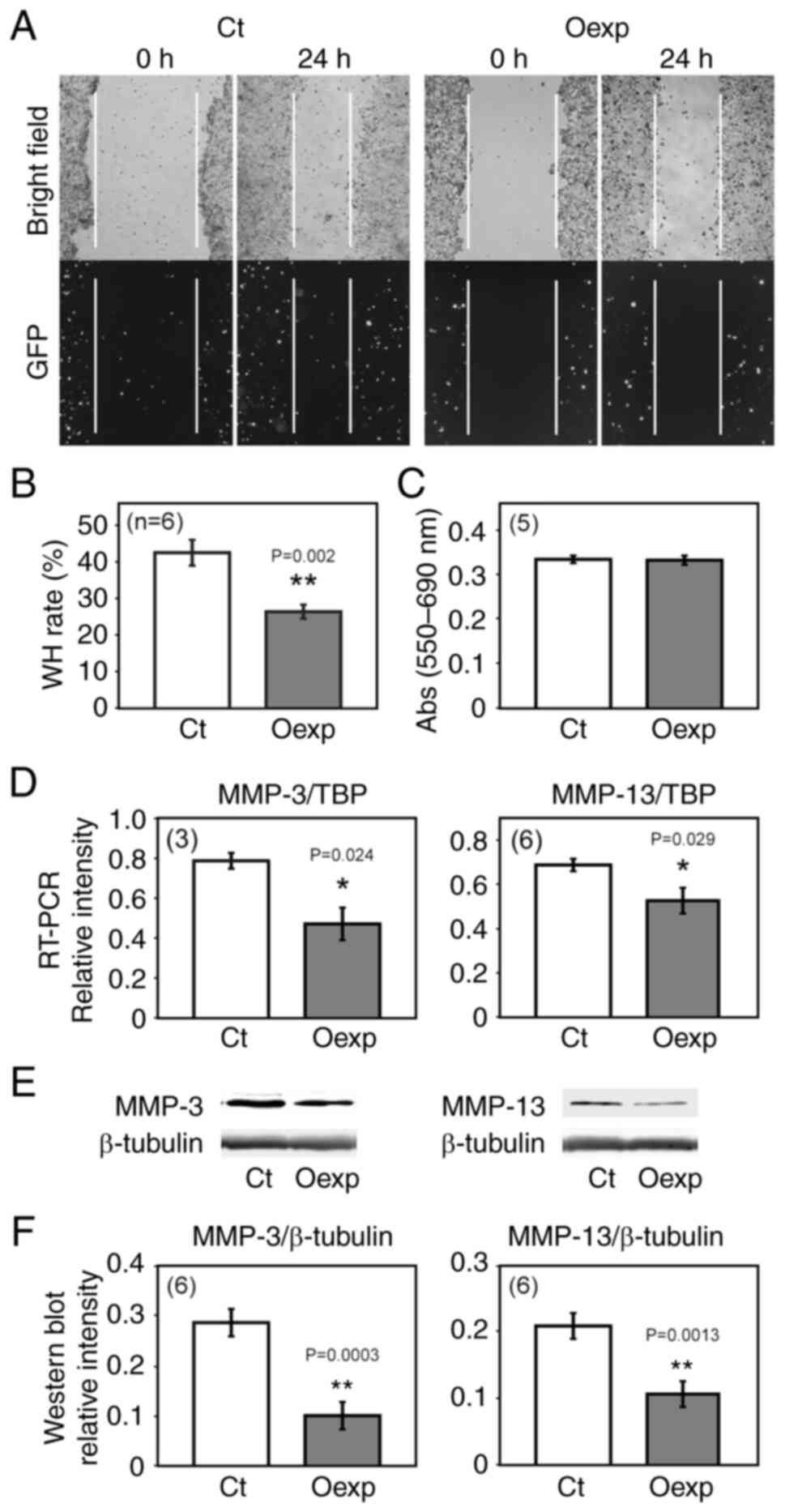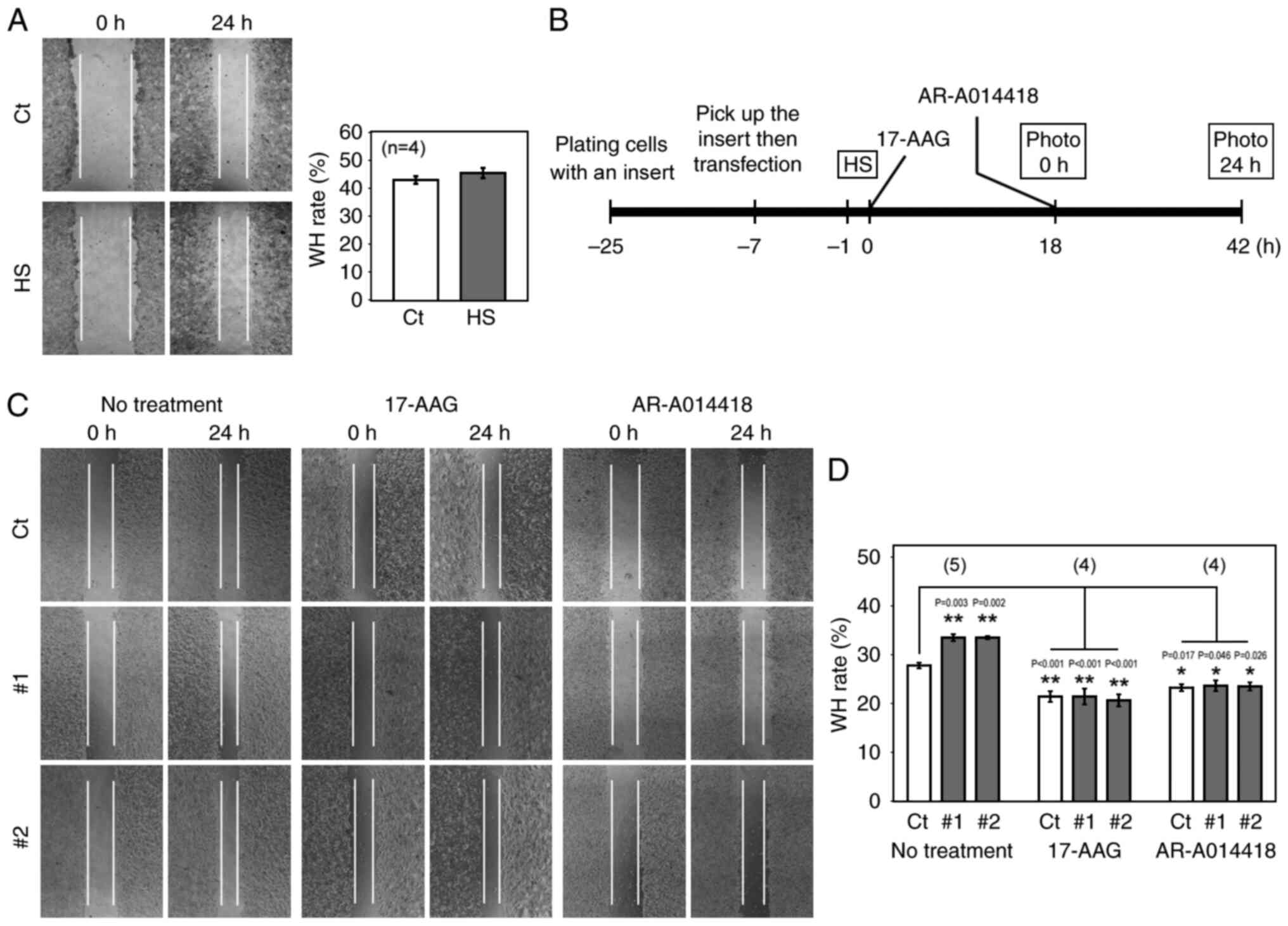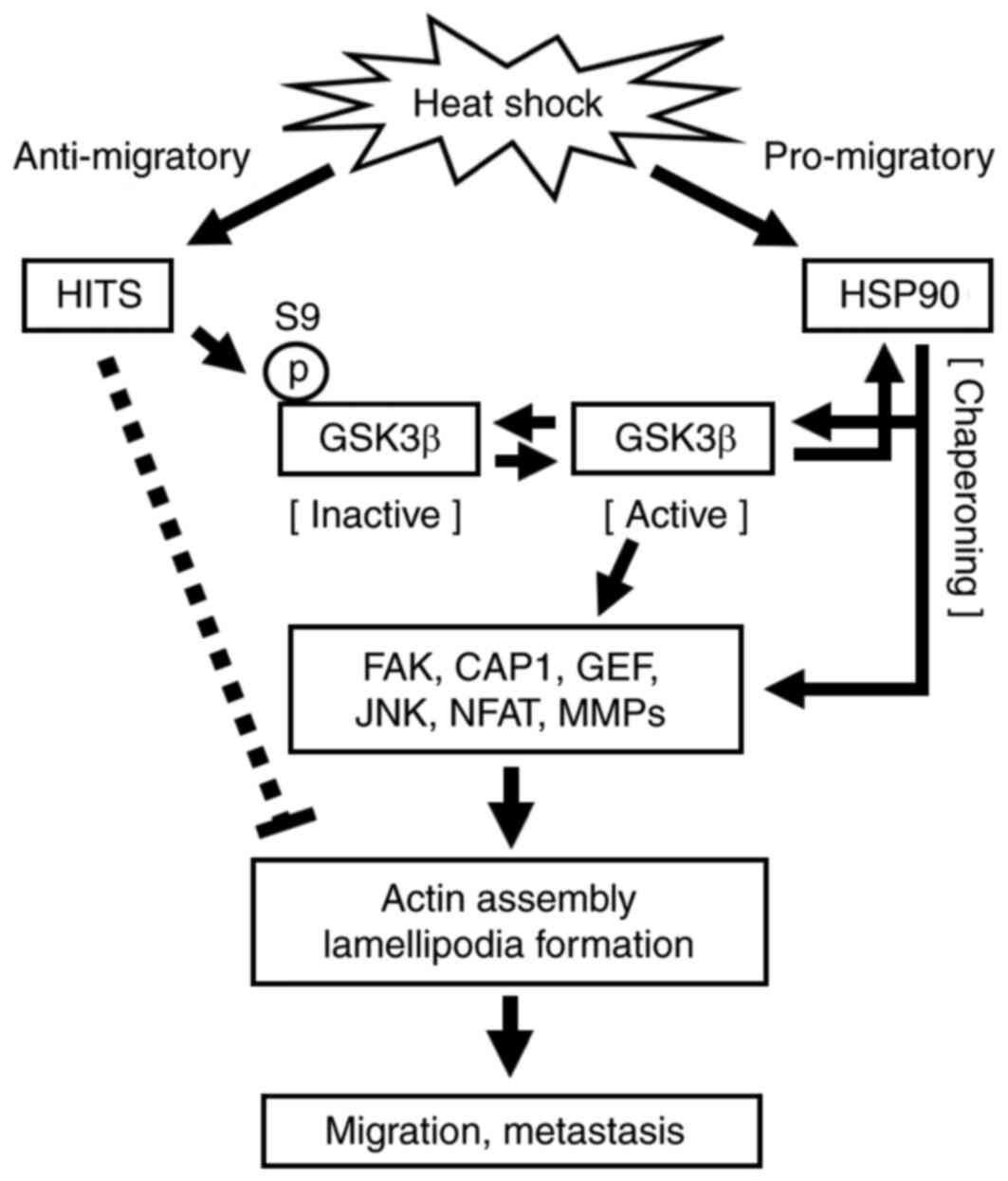|
1
|
Bray F, Ferlay J, Soerjomataram I, Siegel
RL, Torre LA and Jemal A: Global cancer statistics 2018: GLOBOCAN
estimates of incidence and mortality worldwide for 36 cancers in
185 countries. CA Cancer J Clin. 68:394–424. 2018. View Article : Google Scholar : PubMed/NCBI
|
|
2
|
Sung H, Ferlay J, Siegel RL, Laversanne M,
Soerjomataram I, Jemal A and Bray F: Global Cancer Statistics 2020:
GLOBOCAN estimates of incidence and mortality worldwide for 36
cancers in 185 countries. CA Cancer J Clin. 71:209–249. 2021.
View Article : Google Scholar : PubMed/NCBI
|
|
3
|
Leporrier J, Maurel J, Chiche L, Bara S,
Segol P and Launoy G: A population-based study of the incidence,
management and prognosis of hepatic metastases from colorectal
cancer. Br J Surg. 93:465–474. 2006. View
Article : Google Scholar : PubMed/NCBI
|
|
4
|
Zarour LR, Anand S, Billingsley KG, Bisson
WH, Cercek A, Clarke MF, Coussens LM, Gast CE, Geltzeiler CB,
Hansen L, et al: Colorectal cancer liver metastasis: Evolving
paradigms and future directions. Cell Mol Gastroenterol Hepatol.
3:163–173. 2017. View Article : Google Scholar : PubMed/NCBI
|
|
5
|
Dillekås H, Rogers MS and Straume O: Are
90% of deaths from cancer caused by metastases? Cancer Med.
8:5574–5576. 2019. View Article : Google Scholar : PubMed/NCBI
|
|
6
|
Chow FC and Chok KS: Colorectal liver
metastases: An update on multidisciplinary approach. World J
Hepatol. 11:150–172. 2019. View Article : Google Scholar : PubMed/NCBI
|
|
7
|
Ganesh K, Stadler ZK, Cercek A, Mendelsohn
RB, Shia J, Segal NH and Diaz LA Jr: Immunotherapy in colorectal
cancer: rationale, challenges and potential. Nat Rev Gastroenterol
Hepatol. 16:361–375. 2019. View Article : Google Scholar : PubMed/NCBI
|
|
8
|
Van der Jeught K, Xu HC, Li YJ, Lu XB and
Ji G: Drug resistance and new therapies in colorectal cancer. World
J Gastroenterol. 24:3834–3848. 2018. View Article : Google Scholar : PubMed/NCBI
|
|
9
|
George TJ, Franke AJ, Chakravarthy AB, Das
P, Dasari A, El-Rayes BF, Hong TS, Kinsella TJ, Landry JC, Lee JJ,
et al: National Cancer Institute (NCI) state of the science:
Targeted radiosensitizers in colorectal cancer. Cancer.
125:2732–2746. 2019.PubMed/NCBI
|
|
10
|
Hettinga JV, Konings AW and Kampinga HH:
Reduction of cellular cisplatin resistance by hyperthermia-a
review. Int J Hyperthermia. 13:439–457. 1997. View Article : Google Scholar : PubMed/NCBI
|
|
11
|
Yagawa Y, Tanigawa K, Kobayashi Y and
Yamamoto M: Cancer immunity and therapy using hyperthermia with
immunotherapy, radiotherapy, chemotherapy, and surgery. J Cancer
Metastasis Treat. 3:218–230. 2017. View Article : Google Scholar
|
|
12
|
Vassos N and Piso P: Metastatic colorectal
cancer to the peritoneum: Current treatment options. Curr Treat
Options Oncol. 19:492018. View Article : Google Scholar : PubMed/NCBI
|
|
13
|
Dayanc BE, Beachy SH, Ostberg JR and
Repasky EA: Dissecting the role of hyperthermia in natural killer
cell mediated anti-tumor responses. Int J Hyperthermia. 24:41–56.
2008. View Article : Google Scholar : PubMed/NCBI
|
|
14
|
Tsan MF and Gao B: Heat shock proteins and
immune system. J Leukoc Biol. 85:905–910. 2009. View Article : Google Scholar : PubMed/NCBI
|
|
15
|
Ciocca DR and Calderwood SK: Heat shock
proteins in cancer: Diagnostic, prognostic, predictive, and
treatment implications. Cell Stress Chaperones. 10:86–103. 2005.
View Article : Google Scholar : PubMed/NCBI
|
|
16
|
Boroumand N, Saghi H, Avan A, Bahreyni A,
Ryzhikov M, Khazaei M and Hassanian SM: Therapeutic potency of
heat-shock protein-90 pharmacological inhibitors in the treatment
of gastrointestinal cancer, current status and perspectives. J
Pharm Pharmacol. 70:151–158. 2018. View Article : Google Scholar : PubMed/NCBI
|
|
17
|
Nakajima H, Ishigaki Y, Xia QS, Ikeda T,
Yoshitake Y, Yonekura H, Nojima T, Tanaka T, Umehara H, Tomosugi N,
et al: Induction of HITS, a newly identified family with sequence
similarity 107 protein (FAM107B), in cancer cells by heat shock
stimulation. Int J Oncol. 37:583–593. 2010. View Article : Google Scholar : PubMed/NCBI
|
|
18
|
Liu Q, Zhao XY, Bai RZ, Liang SF, Nie CL,
Yuan Z, Wang CT, Wu Y, Chen LJ and Wei YQ: Induction of tumor
inhibition and apoptosis by a candidate tumor suppressor gene DRR1
on 3p21.1. Oncol Rep. 22:1069–1075. 2009.PubMed/NCBI
|
|
19
|
Schmidt MV, Schülke JP, Liebl C, Stiess M,
Avrabos C, Bock J, Wochnik GM, Davies HA, Zimmermann N, Scharf SH,
et al: Tumor suppressor down-regulated in renal cell carcinoma 1
(DRR1) is a stress-induced actin bundling factor that modulates
synaptic efficacy and cognition. Proc Natl Acad Sci USA.
108:17213–17218. 2011. View Article : Google Scholar : PubMed/NCBI
|
|
20
|
Nakajima H, Koizumi K, Tanaka T, Ishigaki
Y, Yoshitake Y, Yonekura H, Sakuma T, Fukushima T, Umehara H, Ueno
S, et al: Loss of HITS (FAM107B) expression in cancers of multiple
organs: Tissue microarray analysis. Int J Oncol. 41:1347–1357.
2012. View Article : Google Scholar : PubMed/NCBI
|
|
21
|
Domoto T, Pyko IV, Furuta T, Miyashita K,
Uehara M, Shimasaki T, Nakada M and Minamoto T: Glycogen synthase
kinase-3β is a pivotal mediator of cancer invasion and resistance
to therapy. Cancer Sci. 107:1363–1372. 2016. View Article : Google Scholar : PubMed/NCBI
|
|
22
|
Domoto T, Uehara M, Bolidong D and
Minamoto T: Glycogen synthase kinase 3β in cancer biology and
treatment. Cells. 9:13882020. View Article : Google Scholar : PubMed/NCBI
|
|
23
|
Beurel E, Grieco SF and Jope RS: Glycogen
synthase kinase-3 (GSK3): Regulation, actions, and diseases.
Pharmacol Ther. 148:114–131. 2015. View Article : Google Scholar : PubMed/NCBI
|
|
24
|
Turano M, Costabile V, Cerasuolo A,
Duraturo F, Liccardo R, Delrio P, Pace U, Rega D, Dodaro CA, Milone
M, et al: Characterisation of mesenchymal colon tumour-derived
cells in tumourspheres as a model for colorectal cancer
progression. Int J Oncol. 53:2379–2396. 2018.PubMed/NCBI
|
|
25
|
Kazi A, Xiang S, Yang H, Delitto D,
Trevino J, Jiang RHY, Ayaz M, Lawrence HR, Kennedy P and Sebti SM:
GSK3 suppression upregulates β-catenin and c-Myc to abrogate
KRas-dependent tumors. Nat Commun. 9:51542018. View Article : Google Scholar : PubMed/NCBI
|
|
26
|
Yoshino Y, Suzuki M, Takahashi H and
Ishioka C: Inhibition of invasion by glycogen synthase kinase-3
beta inhibitors through dysregulation of actin re-organisation via
down-regulation of WAVE2. Biochem Biophys Res Commun. 464:275–280.
2015. View Article : Google Scholar : PubMed/NCBI
|
|
27
|
Chikano Y, Domoto T, Furuta T, Sabit H,
Kitano-Tamura A, Pyko IV, Takino T, Sai Y, Hayashi Y, Sato H, et
al: Glycogen synthase kinase 3β sustains invasion of glioblastoma
via the focal adhesion kinase, Rac1, and c-Jun N-terminal
kinase-mediated pathway. Mol Cancer Ther. 14:564–574. 2015.
View Article : Google Scholar : PubMed/NCBI
|
|
28
|
Kitano A, Shimasaki T, Chikano Y, Nakada
M, Hirose M, Higashi T, Ishigaki Y, Endo Y, Takino T, Sato H, et
al: Aberrant glycogen synthase kinase 3β is involved in pancreatic
cancer cell invasion and resistance to therapy. PLoS One.
8:e552892013. View Article : Google Scholar : PubMed/NCBI
|
|
29
|
Shakoori A, Ougolkov A, Yu ZW, Zhang B,
Modarressi MH, Billadeau DD, Mai M, Takahashi Y and Minamoto T:
Deregulated GSK3β activity in colorectal cancer: Its association
with tumor cell survival and proliferation. Biochem Biophys Res
Commun. 334:1365–1373. 2005. View Article : Google Scholar : PubMed/NCBI
|
|
30
|
Kawauchi T, Chihama K, Nabeshima Y and
Hoshino M: The in vivo roles of STEF/Tiam1, Rac1 and JNK in
cortical neuronal migration. EMBO J. 22:4190–4201. 2003. View Article : Google Scholar : PubMed/NCBI
|
|
31
|
Gayet J, Zhou XP, Duval A, Rolland S,
Hoang JM, Cottu P and Hamelin R: Extensive characterization of
genetic alterations in a series of human colorectal cancer cell
lines. Oncogene. 20:5025–5032. 2001. View Article : Google Scholar : PubMed/NCBI
|
|
32
|
Ahmed D, Eide PW, Eilertsen IA, Danielsen
SA, Eknæs M, Hektoen M, Lind GE and Lothe RA: Epigenetic and
genetic features of 24 colon cancer cell lines. Oncogenesis.
2:e712013. View Article : Google Scholar : PubMed/NCBI
|
|
33
|
Mai W, Miyashita K, Shakoori A, Zhang B,
Yu ZW, Takahashi Y, Motoo Y, Kawakami K and Minamoto T: Detection
of active fraction of GSK3β in cancer cells by nonradioisotopic in
vitro kinase assay. Oncology. 71:297–305. 2006. View Article : Google Scholar : PubMed/NCBI
|
|
34
|
Shakoori A, Mai W, Miyashita K, Yasumoto
K, Takahashi Y, Ooi A, Kawakami K and Minamoto T: Inhibition of
GSK-3β activity attenuates proliferation of human colon cancer
cells in rodents. Cancer Sci. 98:1388–1393. 2007. View Article : Google Scholar : PubMed/NCBI
|
|
35
|
Mai W, Kawakami K, Shakoori A, Kyo S,
Miyashita K, Yokoi K, Jin MJ, Shimasaki T, Motoo Y and Minamoto T:
Deregulated glycogen synthase kinase 3β sustains gastrointestinal
cancer cells survival by modulating human telomerase reverse
transcriptase and telomerase. Clin Cancer Res. 15:6810–6819. 2009.
View Article : Google Scholar : PubMed/NCBI
|
|
36
|
Turunen SP, Tatti-Bugaeva O and Lehti K:
Membrane-type matrix metalloproteases as diverse effectors of
cancer progression. Biochim Biophys Acta Mol Cell Res.
1864:1974–1988. 2017. View Article : Google Scholar : PubMed/NCBI
|
|
37
|
Ning Q, Gan YH, Shi RR and Meng JH:
Effects of HDAC4 on IL-1β-induced matrix metalloproteinase
expression regulated partially through the WNT3A/β-catenin pathway.
Chin Med J (Engl). 134:963–970. 2021. View Article : Google Scholar : PubMed/NCBI
|
|
38
|
Tu Y, Tian Y, Wu Y and Cui S: Clinical
significance of heat shock proteins in gastric cancer following
hyperthermia stress: Indications for hyperthermic intraperitoneal
chemoperfusion therapy. Oncol Lett. 15:9385–9391. 2018.PubMed/NCBI
|
|
39
|
Grimmig T, Moll EM, Kloos K, Thumm R,
Moench R, Callies S, Kreckel J, Vetterlein M, Pelz J, Polat B, et
al: Upregulated heat shock proteins after hyperthermic chemotherapy
point to induced cell survival mechanisms in affected tumor cells
from peritoneal carcinomatosis. Cancer Growth Metastasis.
10:11790644177305592017. View Article : Google Scholar : PubMed/NCBI
|
|
40
|
Chen JS, Hsu YM, Chen CC, Chen LL, Lee CC
and Huang TS: Secreted heat shock protein 90α induces colorectal
cancer cell invasion through CD91/LRP-1 and NF-κB-mediated integrin
αV expression. J Biol Chem. 285:25458–25466. 2010. View Article : Google Scholar : PubMed/NCBI
|
|
41
|
Song D, Guo M, Xu S, Song X, Bai B, Li Z,
Chen J, An Y, Nie Y, Wu K, et al: HSP90-dependent PUS7
overexpression facilitates the metastasis of colorectal cancer
cells by regulating LASP1 abundance. J Exp Clin Cancer Res.
40:1702021. View Article : Google Scholar : PubMed/NCBI
|
|
42
|
Sims JD, McCready J and Jay DG:
Extracellular heat shock protein (HSP)70 and HSP90α assist in
matrix metalloproteinase-2 activation and breast cancer cell
migration and invasion. PLoS One. 6:e188482011. View Article : Google Scholar : PubMed/NCBI
|
|
43
|
Guo W, Reigan P, Siegel D, Zirrolli J,
Gustafson D and Ross D: Formation of
17-allylamino-demethoxygeldanamycin (17-AAG) hydroquinone by
NAD(P)H:quinone oxidoreductase 1: Role of 17-AAG hydroquinone in
heat shock protein 90 inhibition. Cancer Res. 65:10006–10015. 2005.
View Article : Google Scholar : PubMed/NCBI
|
|
44
|
Bhat R, Xue Y, Berg S, Hellberg S, Ormö M,
Nilsson Y, Radesäter AC, Jerning E, Markgren PO, Borgegård T, et
al: Structural insights and biological effects of glycogen synthase
kinase 3-specific inhibitor AR-A014418. J Biol Chem.
278:45937–45945. 2003. View Article : Google Scholar : PubMed/NCBI
|
|
45
|
John JK, Paraiso KH, Rebecca VW, Cantini
LP, Abel EV, Pagano N, Meggers E, Mathew R, Krepler C, Izumi V, et
al: GSK3β inhibition blocks melanoma cell/host interactions by
downregulating N-cadherin expression and decreasing FAK
phosphorylation. J Invest Dermatol. 132:2818–2827. 2012. View Article : Google Scholar : PubMed/NCBI
|
|
46
|
Wu H, Hasan R, Zhang H, Gray J, Williams
D, Miller M, Allen F, Lee V, Kelly T and Zhou GL: Phosphorylation
regulates CAP1 (cyclase-associated protein 1) functions in the
motility and invasion of pancreatic cancer cells. Sci Rep.
9:49252019. View Article : Google Scholar : PubMed/NCBI
|
|
47
|
Zhou GL, Zhang H, Wu H, Ghai P and Field
J: Phosphorylation of the cytoskeletal protein CAP1 controls its
association with cofilin and actin. J Cell Sci. 127:5052–5065.
2014.PubMed/NCBI
|
|
48
|
Rom S, Fan S, Reichenbach N, Dykstra H,
Ramirez SH and Persidsky Y: Glycogen synthase kinase 3β inhibition
prevents monocyte migration across brain endothelial cells via
Rac1-GTPase suppression and down-regulation of active integrin
conformation. Am J Pathol. 181:1414–1425. 2012. View Article : Google Scholar : PubMed/NCBI
|
|
49
|
Yoeli-Lerner M, Chin YR, Hansen CK and
Toker A: Akt/protein kinase B and glycogen synthase kinase-3β
signaling pathway regulates cell migration through the NFAT1
transcription factor. Mol Cancer Res. 7:425–432. 2009. View Article : Google Scholar : PubMed/NCBI
|
|
50
|
Zhao J, Xu J, Zhao J and Zhang R: EFEMP2
promotes colon cancer cell invasion and growth through the ERK1/2
signaling pathway. Int J Clin Exp Pathol. 12:851–856.
2019.PubMed/NCBI
|
|
51
|
Rath T, Stöckle J, Roderfeld M,
Tschuschner A, Graf J and Roeb E: Matrix metalloproteinase-13 is
regulated by toll-like receptor-9 in colorectal cancer cells and
mediates cellular migration. Oncol Lett. 2:483–488. 2011.
View Article : Google Scholar : PubMed/NCBI
|
|
52
|
Nakajima H and Koizumi K: Family with
sequence similarity 107: A family of stress responsive small
proteins with diverse functions in cancer and the nervous system
(Review). Biomed Rep. 2:321–325. 2014. View Article : Google Scholar : PubMed/NCBI
|
|
53
|
Kretzschmar A, Schülke JP, Masana M, Dürre
K, Müller MB, Bausch AR and Rein T: The stress-inducible protein
DRR1 exerts distinct effects on actin dynamics. Int J Mol Sci.
19:39932018. View Article : Google Scholar : PubMed/NCBI
|
|
54
|
Guo J, Bian Y, Wang Y, Chen L, Yu A and
Sun X: FAM107B is regulated by S100A4 and mediates the effect of
S100A4 on the proliferation and migration of MGC803 gastric cancer
cells. Cell Biol Int. 41:1103–1109. 2017. View Article : Google Scholar : PubMed/NCBI
|
|
55
|
Allgöwer C, Kretz AL, von Karstedt S,
Wittau M, Henne-Bruns D and Lemke J: Friend or foe: S100 proteins
in cancer. Cancers (Basel). 12:20372020. View Article : Google Scholar : PubMed/NCBI
|
|
56
|
Chen M, Bresnick AR and O'Connor KL:
Coupling S100A4 to rhotekin alters Rho signaling output in breast
cancer cells. Oncogene. 32:3754–3764. 2013. View Article : Google Scholar : PubMed/NCBI
|
|
57
|
Huang CY, Wei PL, Chen WY, Chang WC and
Chang YJ: Silencing heat shock protein 27 inhibits the progression
and metastasis of colorectal cancer (CRC) by maintaining the
stability of stromal interaction molecule 1 (STIM1) proteins.
Cells. 7:2622018. View Article : Google Scholar : PubMed/NCBI
|
|
58
|
Lin Y, Peng N, Zhuang H, Zhang D, Wang Y
and Hua ZC: Heat shock proteins HSP70 and MRJ cooperatively
regulate cell adhesion and migration through urokinase receptor.
BMC Cancer. 14:6392014. View Article : Google Scholar : PubMed/NCBI
|
|
59
|
Moser C, Lang SA, Kainz S, Gaumann A,
Fichtner-Feigl S, Koehl GE, Schlitt HJ, Geissler EK and Stoeltzing
O: Blocking heat shock protein-90 inhibits the invasive properties
and hepatic growth of human colon cancer cells and improves the
efficacy of oxaliplatin in p53-deficient colon cancer tumors in
vivo. Mol Cancer Ther. 6:2868–2878. 2007. View Article : Google Scholar : PubMed/NCBI
|
|
60
|
Hagn F, Lagleder S, Retzlaff M, Rohrberg
J, Demmer O, Richter K, Buchner J and Kessler H: Structural
analysis of the interaction between Hsp90 and the tumor suppressor
protein p53. Nat Struct Mol Biol. 18:1086–1093. 2011. View Article : Google Scholar : PubMed/NCBI
|
|
61
|
Lacey T and Lacey H: Linking hsp90′s role
as an evolutionary capacitator to the development of cancer. Cancer
Treat Res Commun. 28:1004002021. View Article : Google Scholar : PubMed/NCBI
|
|
62
|
Dou F, Chang X and Ma D: Hsp90 maintains
the stability and function of the Tau phosphorylating kinase GSK3β.
Int J Mol Sci. 8:51–60. 2007. View Article : Google Scholar
|
|
63
|
Banz VM, Medová M, Keogh A, Furer C,
Zimmer Y, Candinas D and Stroka D: Hsp90 transcriptionally and
post-translationally regulates the expression of NDRG1 and
maintains the stability of its modifying kinase GSK3β. Biochim
Biophys Acta. 1793:1597–1603. 2009. View Article : Google Scholar : PubMed/NCBI
|
|
64
|
Tang W, Wu Y, Qi X, Yu R, Lu Z, Chen A,
Fan X and Li J: PGK1-coupled HSP90 stabilizes GSK3β expression to
regulate the stemness of breast cancer stem cells. Cancer Biol Med.
19:486–503. 2022. View Article : Google Scholar : PubMed/NCBI
|
|
65
|
Muller P, Ruckova E, Halada P, Coates PJ,
Hrstka R, Lane DP and Vojtesek B: C-terminal phosphorylation of
Hsp70 and Hsp90 regulates alternate binding to co-chaperones CHIP
and HOP to determine cellular protein folding/degradation balances.
Oncogene. 32:3101–3110. 2013. View Article : Google Scholar : PubMed/NCBI
|
|
66
|
Zhang C, Li S and Zhao Z: β-Elemene
promotes apoptosis induced by hyperthermia via inhibiting HSP70.
Dis Markers. 2022:73130262022.PubMed/NCBI
|
|
67
|
Schwock J, Dhani N, Cao MP, Zheng J,
Clarkson R, Radulovich N, Navab R, Horn LC and Hedley DW: Targeting
focal adhesion kinase with dominant-negative FRNK or Hsp90
inhibitor 17-DMAG suppresses tumor growth and metastasis of SiHa
cervical xenografts. Cancer Res. 69:4750–4759. 2009. View Article : Google Scholar : PubMed/NCBI
|
|
68
|
Taiyab A and Rao ChM: HSP90 modulates
actin dynamics: Inhibition of HSP90 leads to decreased cell
motility and impairs invasion. Biochim Biophys Acta. 1813:213–221.
2011. View Article : Google Scholar : PubMed/NCBI
|
|
69
|
Liu Z, Li H, He L, Xiang Y, Tian C, Li C,
Tan P, Jing J, Tian Y, Du L, et al: Discovery of small-molecule
inhibitors of the HSP90-calcineurin-NFAT pathway against
glioblastoma. Cell Chem Biol. 26:352–365.e7. 2019. View Article : Google Scholar : PubMed/NCBI
|
|
70
|
Lu C, Chen D, Zhang Z, Fang F, Wu Y, Luo L
and Yin Z: Heat shock protein 90 regulates the stability of c-Jun
in HEK293 Cells. Mol Cells. 24:210–214. 2007.PubMed/NCBI
|
|
71
|
Stellas D, El Hamidieh A and Patsavoudi E:
Monoclonal antibody 4C5 prevents activation of MMP2 and MMP9 by
disrupting their interaction with extracellular HSP90 and inhibits
formation of metastatic breast cancer cell deposits. BMC Cell Biol.
11:512010. View Article : Google Scholar : PubMed/NCBI
|
|
72
|
Jia D, Rao W, Wang C, Jin C, Wang S, Chen
D, Zhang M, Guo J, Chang Z and Liu J: Inhibition of B16 murine
melanoma metastasis and enhancement of immunity by fever-range
whole body hyperthermia. Int J Hyperthermia. 27:275–285. 2011.
View Article : Google Scholar : PubMed/NCBI
|
|
73
|
Byun YH, Gwak HS, Kwon JW, Song MK, Shin
SH, Jo YH, Yoo H and Lee SH: Local recurrence of brain metastasis
reduced by intra-operative hyperthermia treatment. Int J
Hyperthermia. 35:168–175. 2019. View Article : Google Scholar : PubMed/NCBI
|
|
74
|
Zhao J, Lv Y, Cai Y, Wei W, Yin C, Wang X,
Hao Z, Shen C and Wang H: Hyperthermic carbon dioxide
pneumoperitoneum reinforces the inhibition of 5-FU on the
proliferation and invasion of colon cancer. Oncol Rep. 37:492–500.
2017. View Article : Google Scholar : PubMed/NCBI
|
|
75
|
Kumar S, Stokes J III, Singh UP, Scissum
Gunn K, Acharya A, Manne U and Mishra M: Targeting HSP70: A
possible therapy for cancer. Cancer Lett. 374:156–166. 2016.
View Article : Google Scholar : PubMed/NCBI
|
|
76
|
Kryeziu K, Bruun J, Guren TK, Sveen A and
Lothe RA: Combination therapies with HSP90 inhibitors against
colorectal cancer. Biochim Biophys Acta Rev Cancer. 1871:240–247.
2019. View Article : Google Scholar : PubMed/NCBI
|
|
77
|
Zhou L, Zhang M, Fu Q, Li J and Sun H:
Targeted near infrared hyperthermia combined with immune
stimulation for optimized therapeutic efficacy in thyroid cancer
treatment. Oncotarget. 7:6878–6890. 2016. View Article : Google Scholar : PubMed/NCBI
|
|
78
|
Vriend LEM, van den Tempel N, Oei AL,
L'Acosta M, Pieterson FJ, Franken NAP, Kanaar R and Krawczyk PM:
Boosting the effects of hyperthermia-based anticancer treatments by
HSP90 inhibition. Oncotarget. 8:97490–97503. 2017. View Article : Google Scholar : PubMed/NCBI
|
|
79
|
Daunys S, Matulis D and Petrikaitė V:
Synergistic activity of HSP90 inhibitors and anticancer agents in
pancreatic cancer cell cultures. Sci Rep. 9:161772019. View Article : Google Scholar : PubMed/NCBI
|
|
80
|
Baran B, Mert Ozupek N, Yerli Tetik N,
Acar E, Bekcioglu O and Baskin Y: Difference between left-sided and
right-sided colorectal cancer: A focused review of literature.
Gastroenterology Res. 11:264–273. 2018. View Article : Google Scholar : PubMed/NCBI
|
|
81
|
de Vries NL, Swets M, Vahrmeijer AL,
Hokland M and Kuppen PJ: The immunogenicity of colorectal cancer in
relation to tumor development and treatment. Int J Mol Sci.
17:10302016. View Article : Google Scholar : PubMed/NCBI
|
|
82
|
Picard E, Verschoor CP, Ma GW and Pawelec
G: Relationships between immune landscapes, genetic subtypes and
responses to immunotherapy in colorectal cancer. Front Immunol.
11:3692020. View Article : Google Scholar : PubMed/NCBI
|
|
83
|
Zhang H, Du Y, Wang Z, Lou R, Wu J and
Feng J: Integrated analysis of oncogenic networks in colorectal
cancer identifies GUCA2A as a molecular marker. Biochem Res Int.
2019:64694202019. View Article : Google Scholar : PubMed/NCBI
|
|
84
|
Mah WC, Thurnherr T, Chow PK, Chung AY,
Ooi LL, Toh HC, Teh BT, Saunthararajah Y and Lee CG: Methylation
profiles reveal distinct subgroup of hepatocellular carcinoma
patients with poor prognosis. PLoS One. 9:e1041582014. View Article : Google Scholar : PubMed/NCBI
|
|
85
|
Song MA, Tiirikainen M, Kwee S, Okimoto G,
Yu H and Wong LL: Elucidating the landscape of aberrant DNA
methylation in hepatocellular carcinoma. PLoS One. 8:e557612013.
View Article : Google Scholar : PubMed/NCBI
|
|
86
|
Kan S, Chai S, Chen W and Yu B: DNA
methylation profiling identifies potentially significant
epigenetically-regulated genes in glioblastoma multiforme. Oncol
Lett. 18:1679–1688. 2019.PubMed/NCBI
|
|
87
|
Parameswaran R, Ramakrishnan P, Moreton
SA, Xia Z, Hou Y, Lee DA, Gupta K, deLima M, Beck RC and Wald DN:
Repression of GSK3 restores NK cell cytotoxicity in AML patients.
Nat Commun. 7:111542016. View Article : Google Scholar : PubMed/NCBI
|
|
88
|
Cichocki F, Valamehr B, Bjordahl R, Zhang
B, Rezner B, Rogers P, Gaidarova S, Moreno S, Tuininga K, Dougherty
P, et al: GSK3 inhibition drives maturation of NK cells and
enhances their antitumor activity. Cancer Res. 77:5664–5675. 2017.
View Article : Google Scholar : PubMed/NCBI
|
|
89
|
Noh KT, Son KH, Jung ID, Kang TH, Choi CH
and Park YM: Glycogen synthase kinase-3β (GSK-3β) inhibition
enhances dendritic cell-based cancer vaccine potency via
suppression of interferon-γ-induced indoleamine 2,3-dioxygenase
expression. J Biol Chem. 290:12394–12402. 2015. View Article : Google Scholar : PubMed/NCBI
|
|
90
|
Taylor A, Harker JA, Chanthong K,
Stevenson PG, Zuniga EI and Rudd CE: Glycogen synthase kinase 3
inactivation drives T-bet-mediated downregulation of co-receptor
PD-1 to enhance CD8(+) cytolytic T cell responses. Immunity.
44:274–286. 2016. View Article : Google Scholar : PubMed/NCBI
|
|
91
|
Grassilli E, Narloch R, Federzoni E,
Ianzano L, Pisano F, Giovannoni R, Romano G, Masiero L, Leone BE,
Bonin S, et al: Inhibition of GSK3B bypass drug resistance of
p53-null colon carcinomas by enabling necroptosis in response to
chemotherapy. Clin Cancer Res. 19:3820–3831. 2013. View Article : Google Scholar : PubMed/NCBI
|















